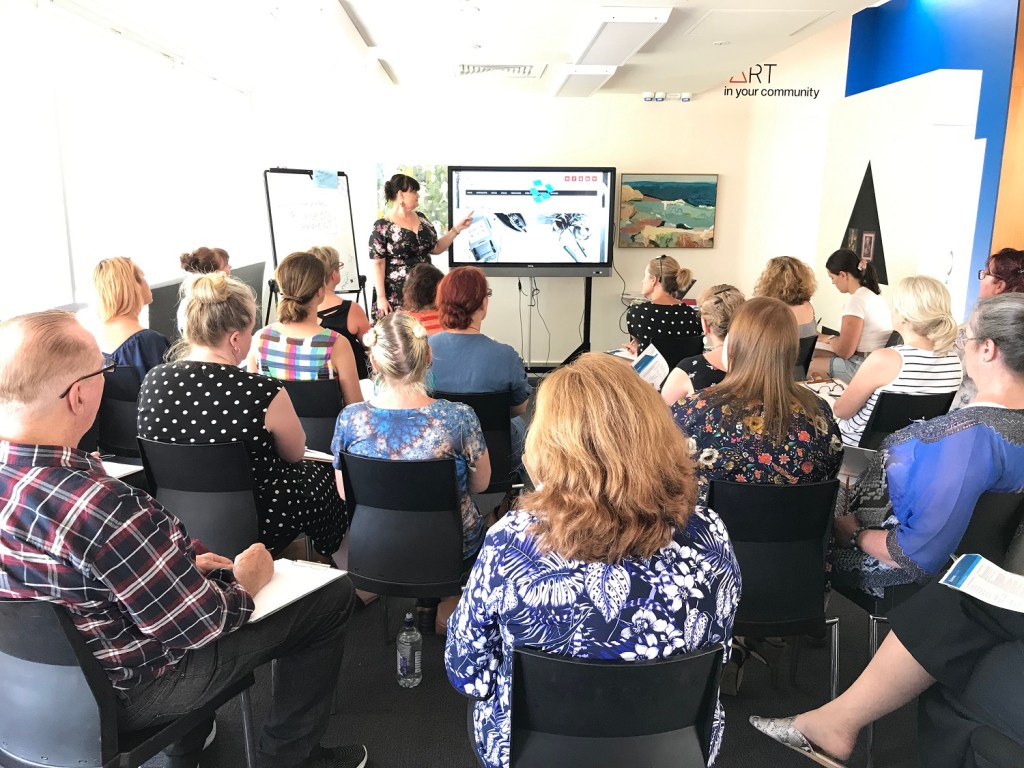Most people get into the screen business to be creative — not to stare at spreadsheets.
However, the screen business is also just that: a business. Whether you’re an emerging practitioner or running a successful production company, you need business skills to help you put your best foot forward and craft a sustainable career. This encompasses everything from the ability to write an invoice through to a marketing strategy, or just knowing how to get through a networking event without feeling compelled to hide in the bathroom (we’ve all been there!).
For freelancers in particular, business skills provide an anchor in the choppy seas of a predominantly gig-to-gig industry. Experienced producers and business leaders need their own anchors too, as they navigate scaling their companies through cycles of production.
However, Creative Plus Business director Monica Davidson, whose social enterprise focuses on giving creatives small business, financial literacy, and marketing skills, observes many creatives put obstacles in the way of learning business skills — namely fear.
No topic is as fraught with emotion as money. Financial management often gets lumped into the ‘too hard’ basket for many freelancers — most of us weren’t taught financial literacy at school, and this leads to a perilous cycle of shame and guilt. In turn, it truncates potential; Davidson has seen sole traders deliberately hold themselves back from high turnover so they don’t have to register for GST.
The good news? Everything you need to do to manage your finances with confidence can be learned. Yes, even if it is super boring!
“The benefit of learning how to do all of this is empowerment. The more you learn to manage your own finances, handle your irregular income, and navigate the famine and the feast of screen work and — heaven forbid — do your own taxes and actually have meaningful conversations with people about money, the better off you’ll be,” Davidson says.
“Yes, it’s going to be short-term pain and lots of boring numbers, but there comes a point at which it’s not scary anymore. And for most people that is a tremendous relief and opens up loads of opportunities and possibilities!”
Conquering financial management also means accepting the reality that the industry suffers peaks and troughs. Davidson urges people to prepare accordingly: “Put money aside during feast time with the full assumption famine is coming.”
She also recommends creatives diversify income streams and use down time between gigs effectively — as a time to upskill, network, and get marketing plans, taxes, websites or social media in order.
“In this cyclical gig industry, thinking of yourself as only having value because someone else is paying you is really dangerous. You are valuable all the time!” Davidson says.
“If someone isn’t paying you, where else could you put that value? Could you invest it into your own marketing or into training yourself to do something new? That way, we’re always thinking of ourselves as working.”

This is an industry built on word of mouth and recommendation, but many people also have fear of networking. Davidson reframes networking as relationship building, and counters the industry is not about “who you know”, but who thinks of you as an interesting, friendly professional with empathy.
To that end, she says go to industry events, but not to pitch — to make friends. Talking to someone just to get your next gig or project up is short-sighted.
“Why people hate networking is that fear that they’re going to get either pitched at or they’re going to be expected to pitch.
“Once you stop pitching at people, everyone gets an opportunity to get to know you. In this industry, you are not going to get hired or booked just because you’re clever, you have talent or a track record, you’re going to get hired, funded or whatever it might be because people know you and they like you.”
It might sound counterintuitive, but many creatives also have a lot of fear about where to take their career or company as they get runs on the board. Creative Plus Business works with companies on bespoke plans to navigate growth sustainably; Davidson says much of her work is also helping people “cope with success”, as it presents its own challenges.
“Everybody who works in our industry has got a pretty close relationship to failure in one way or another. Failure’s really easy — we’ve all failed before — but success is hard.
“Getting a big whack of funding for a project, needing to hire new people or suddenly realising that you’re not just lurching from one freelance gig to another any longer, but you’re actually a name or a known entity and people want to engage your services — that can be quite frightening!”
And while financial sustainability is one thing, emotional sustainability is another. If you’re going to be your own boss, Davidson recommends you be a nice boss; practice kindness and empathy towards yourself, and be mindful of your own capacity. Track your own highs and lows as you move through jobs, and don’t be afraid to reach out to a friend for support or take a day off.
“The more experienced we get, the more we need to be aware of where our highs and lows are in terms of our wellbeing. Whenever I used to come off a shoot, I crashed — not just physically, but emotionally. So understand that might happen again, and build recovery into your schedule,” Davidson says.
“Burnout is too prevalent in our industry. I think we can lay a lot of the blame for that at the feet of the industry and the culture that we’ve all come up with. But we can take a little bit of responsibility for ourselves and for each other, to be supportive to each other and create a new culture that is holistic and supportive.”
Creative Plus Business offers a variety of business support for creatives, including workshops, webinars, mentoring, coaching and bespoke consultancy.


